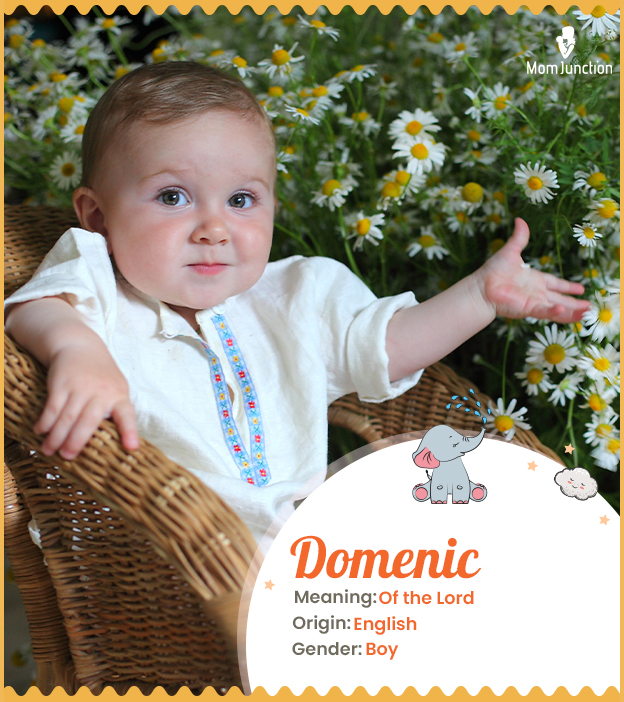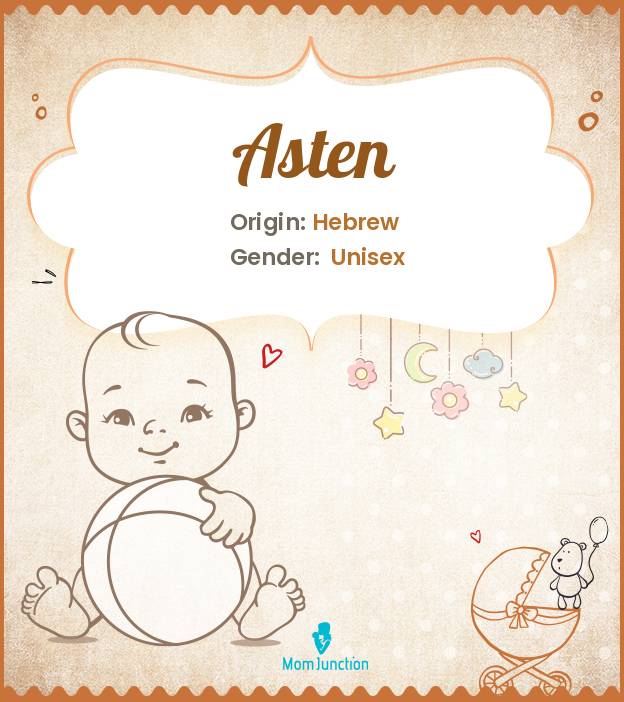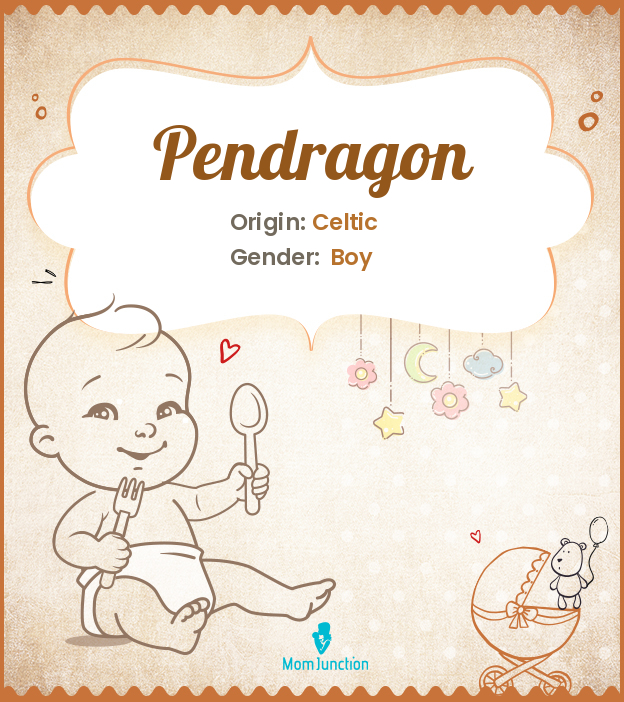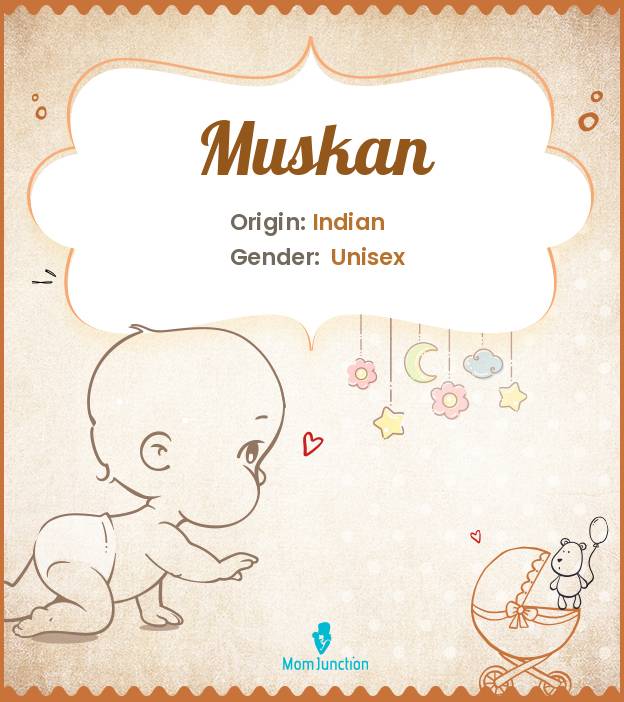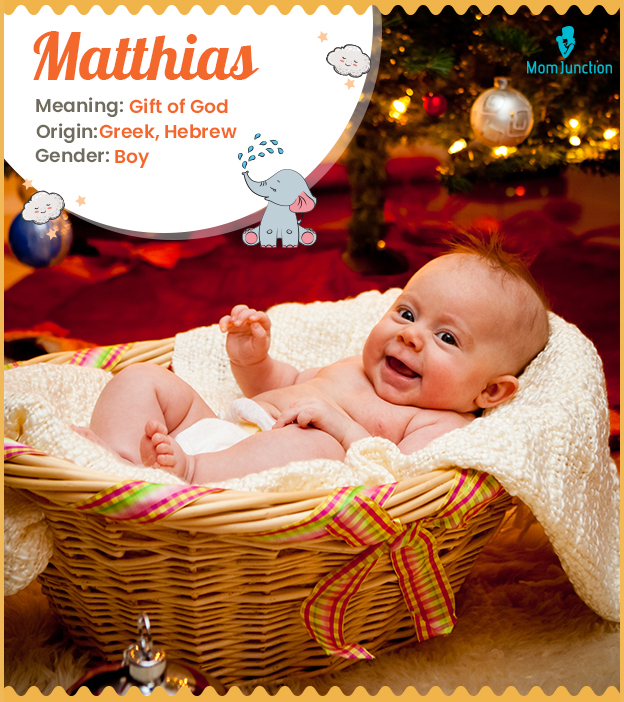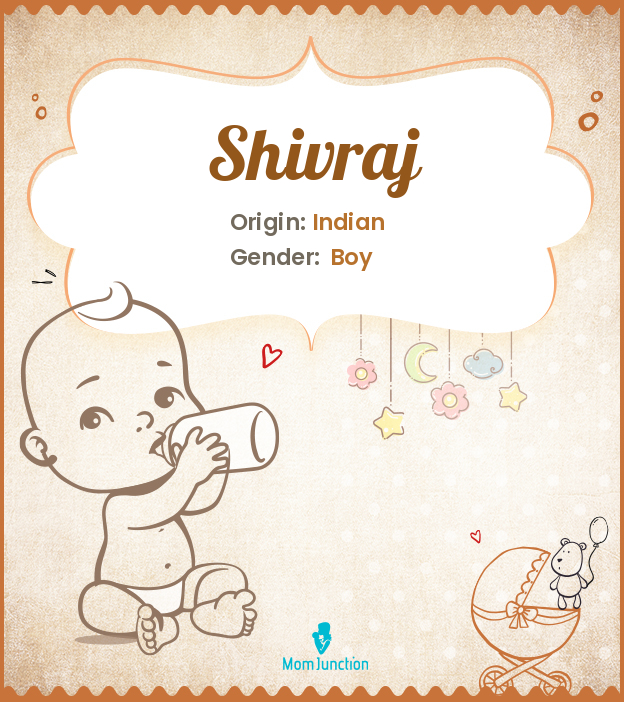
Image: Shutterstock

Muslims are practitioners of Islam, a monotheistic Abrahamic religion. They regard the Quran as their holy book, believing it to be the verbatim revelation of God to Prophet Muhammad. As a result, Muslim last names or surnames have religious significance and are frequently linked to the Prophet. The ancestors employed the patronymic naming system, with names derived from fathers and forebears. Muslim surnames can reveal a lot about a person’s ancestry, such as the country or community they come from, their profession, or their relationship with the original bearer of their family name. We’ve compiled a list of Muslim surnames with their interesting origins and meanings in this post.
Key Pointers
- Muslim surnames carry occupational, ancestral, and religious origins.
- These names are often derived from Persian and Arabic languages.
- Some surnames are linked to specific tribes, Islamic holy books, and influential figures.
- Among the famous Islamic surnames are Mirza, Muhammad, Aziz, and Yousuf.
100 Popular Muslim Last Names Or Surnames With Meanings
1. Abbas
It is derived from the Arabic personal name meaning “austere” or “stern.” This name has Arabic and Persian origins and is also used as a first or middle name.
2. Abdalla
This is a variant of the surname “Abdullah,” who is the father of the Prophet Muhammad. It means “servant of Allah.”
3. Afzal
The surname originated from an Arabic word and means “best” or “better.” It is an epithet for a learned man.
4. Ahmed
It is also spelled as “Ahmad.” The name is derived from the Arabic word “Hamida,” which means “the most praised.” The name is one of the epithets of Prophet Mohammad.
5. Akel
It is derived from a personal name “Aqil” that stands for “intelligent,” “wise,” or “sensible” in both Persian and Arabic.
6. Akhtar

Image: Shutterstock
If you are searching for a Pakistani last name, Akhtar—made famous by Shoaib Akhtar, the Pakistani cricketer—is an ideal option. It is also popular in India, Bangladesh, and Iran. It is derived from a Persian word that means “good luck” or “star.”
7. Aman
It comes from Arabic and means “trust,” “safety,” “tranquility,” or “protection.” It is often used in other names such as Aman Allah, meaning “protection of Allah.”
8. Amir
This is based on the Arabic word “emir,” meaning “prince,” or “master.” It has been used to refer to rulers of caliphs or provinces.
9. Atallah
It is a variant of the surname “Ataullah,” meaning “gift of God.” This is a combination of the Arabic words “Ata,” meaning “gift,” and “Allah,” meaning “God.”
10. Aziz
This surname is derived from the Arabic baby name “Abd al-Aziz,” meaning “servant of the beloved,” or “servant of the mighty.”
11. Badie
It is another spelling for Badi, an Arabic personal name that means “unique,” “beautiful,” or “wonderful.” This is a short form of Al-Badi, “the Sole Creator,” an attribute of Allah.
12. Baig
It is derived from the Turkish word “Beg,” which means “Lord” or “Commander.” The word was a title of respect and refers to a local administrator in the Ottoman Empire.
13. Bari
This surname is taken from the Arabic personal name, “bari” meaning “originator.” It is a shortened form of Al-Bari, “the Creator,” and it is one of the attributes of Allah.
14. Bashir
It is taken from the personal name Bashir, which comes from Arabic and means “the one who brings good news.”
15. Begum
It was originally an honorific title for addressing a respectable lady or the wife of “Beg,” the Turkish title for a commander or any higher official.
16. Beshara
It is a variant of the Arabic surname, “Bishara,” which means “good news.”
17. Bilal
The name of one of the companions of the Prophet Muhammad, who became the first Muezzin (caller to prayer). It refers to Arabic “bilal,” meaning “moist.” If you’ve been seeking Sahabi names, this is a great option.
18. Dada
It is derived from the name Dada of Persian origin, meaning “given” or “gift of God.”
19. Dallal
A variant of the Arabic word “Dilal,” meaning “auctioneer.” It was originally an occupational name for a broker.
20. Dar
It is derived from the Persian word “Dar,” meaning “holder,” “keeper,” or “master.” The surname is also suffixed or prefixed with words to form other surnames.
21. Darwish
It originates from the Turkish and Persian word “Dervi,” meaning “beggar” or “needy.” This surname was originally used to indicate a Sufi holy man.
22. Din
It is derived from Turkish, Arabic, and Persian words “Deen,” which means “religion.”
23. Doud
It is a variant of the name “Dawud,” which is the Arabic version of the name “David.” The name “Dawud” in Arabic means “messenger of Allah.”
24. Ebrahim
It is the Arabic form of the name of Prophet Abraham, which means “father of a multitude.”
25. Eid
This surname is derived from the Arabic word “Eid,” meaning “festivity.” It is usually used as a part of the name for a baby born on any of the two festive days, namely Eid al-Fitr and Eid al-Adha.
26. Elamin
It is a variant of the surname “Al-Amin,” which means “faithful” or “trustworthy.” It is an Arabic epithet and honorific title of the Prophet.
27. Elbaz

Image: Shutterstock
It is derived from the Arabic and Persian word “Baz,” meaning “falcon,” with the addition of “el” referring to “the.” It was originally used by falconers or those who belonged to royal or aristocratic families.
28. Emami
This surname is an adjective derivative of the Arabic word “Imam,” meaning “one who leads the way.” It is an honorific title for the one who leads prayers at the mosque.
29. Fadel
This surname comes from an Arabic word that means “virtuous,” “generous,” or “excellent.”
30. Faraj
It comes from Arabic and means “remedy for grief or troubles” or “comfort.”
31. Farha
This is a variant spelling of the Arabic name “Farah” or “Fariha” and means “happiness,” “joy,” or “glee.” It is also used as a first name.
32. Farooq
It means “distinguisher” in Arabic and is derived from the element “Faruq.” This is often used as a byname, as in “Al-Faruq,” meaning “the one who distinguishes between right and wrong.”
33. Farran
It is a variant of the name “Farhan.” The name originates from Arabic and means “glad” or “happy.”
34. Fawaz
It originates from “Fawz,” the Arabic word for “victory” or “triumph.” The name is also used as a first name.
35. Firman
It is an alternative spelling of the name “Farman,” which originates from Persian and means “order,” “decree,” or “command.”
36. Gaber
It is derived from the Arabic personal name, “Jabir,” meaning “healer,” “bone-setter,” or “comforter.” The name might have originally been an occupational one.
37. Ghaffari
This surname comes from the Arabic word “Ghaffar,” meaning “merciful.” The word is also part of the name “Al-Ghaffar,” one of the names of Allah.
38. Ghanem
The name has Arabic and Turkish origins, and means “prosperous” or “successful.”
39. Habeeb
It is a variant of the Arabic word “Habib,” which means “beloved,” “love,” or “darling.” It is an epithet for Mohammad and used in “Habibullah,” meaning “beloved of Allah.”
40. Hadi
Hadi means “guide” or “leader” in Arabic. This surname is taken from “Al-Hadi,” which is one of the honorific names for Allah and means “the guide.”
41. Hafeez
It is derived from “Hafiz,” an Arabic word that means “protector” or guardian.” The name is also part of “Al-Hafiz,” one of the honorific titles of Allah.
42. Hai
It is derived from the Arabic word “Al-haya,” meaning “life.” The name is also considered as one of the honorific titles of Allah.
43. Haidar
This surname means “lion” or “brave,” and comes from Arabic. The name is also used as a first name.
44. Hakim
It is the Arabic word for “wise” or “learned.” The name assigned to Allah as “Al-Hakim,” meaning “the all-wise.”
45. Hallal
This surname has an Arabic origin and means “resolver” or “solver.”
46. Hamdan
Hamdan means “much praise” or the “praised one” in Arabic. The name is a derivative of the Arabic word “Hamid,” meaning “praised” or “praiseworthy.”
47. Hana
This is derived from an Arabic female personal name “Hana,” which means “happiness” or “bliss.”
48. Haq
It is a derivative of the Arabic word “Haqeeqat,” meaning “truth,” “true,” or “real.” This surname is taken from Allah’s attributes, “Al-Haqq,” which means “the truth.”
49. Hariri
It is derived from “Harir,” the Arabic word for “silk.” The name likely has an occupational origin referring to a silk merchant or a maker of silk clothes.
50. Harroun
It is derived from “Harun,” which is the Arabic variant of “Aaron,” a prophet mentioned in the Quran. Aaron means “messenger” in Hebrew.
51. Hasan
This surname means “handsome” or “good” in Arabic. Hasan was also the name of Hasan ibn Ali, the grandson of Prophet Muhammad.
52. Hashim
Hashim means “crusher” in Arabic. It is the byname of the great-grandfather of the Prophet Muhammad.
53. Mian
It is a title of respect as in Urdu “Mian,” meaning “sir.” The word comes from the Persian word “Miyan,” meaning “between,” used to address an older man.
54. Mina

Image: Shutterstock
It is derived from the Arabic element “minah,” meaning “favors” or “gifts.” Another origin could be the Persian word “Mina,” meaning the “azure color.”
55. Minhas
The surname is derived from the Arabic word “Minhaj,” which means “way,” “order,” or “method.”
56. Mirza
It is derived from a historical title of Persian origin that denotes a royal prince or high nobleman. It is a shortened form of “Mir-Zadeh,” meaning “child of a king.”
57. Mitri
It is possibly derived from the Arabic word “Misri,” which refers to an Egyptian.
58. Moghadam
Moghadam or Moghaddam is a Perso-Arabic surname that originates from the Arabic word “Muqaddam,” meaning “chief,” “head,” “administrator,” or “supervisor.”
59. Mohiuddin
It is an Indian variant of the Arabic surname “Mohy al-Din,” meaning “reviver of religion.”
60. Mona
It is a variant of the name “Muna,” which comes from the Arabic word “Munyah,” meaning “desires” or “wishes.”
61. Muhammad
This name is based on the Arabic word “Muhammad,” meaning “praiseworthy.” It is the name of the founder of Islam, and extremely common throughout the Muslim religion. It is also used as a first name.
62. Mustafa
It is from the Arabic word “Mustafa,” meaning “chosen.” The name is also derived from “Al-Mustafa,” an epithet of Prophet Muhammad. Mustafa is also used as a first name.
63. Nagi
It is derived from the Arabic word “Naji,” meaning “close friend.” “Najiullah,” meaning “friend of Allah,” is one of the bynames of the Prophet Muhammad.
64. Nasir
This last name means “helper” or “supporter” in Arabic. It is also found in compound names such as “Nasruddin,” meaning “protector of religion.”
65. Niazi
are beautiful in every way, as exemplified by the name Niazi. It comes from the Persian word “Niyaz,” which means “desire,” “wish,” “prayer,” or “requirement.”
66. Obeid
It is a variant of the Arabic name “Ubayd,” which means “humble servant” or an “inferior servant.” This name is also found in combinations, such as in “Obeidullah,” meaning “humble servant of Allah.”
67. Odeh
This surname means “returning visitor” and is a variant of “Aidah,” which is of Arabic origin.
68. Omar
This is related to the Arabic word “amir,” meaning “full of life,” “substantial,” “large,” or “prosperous.”
 Trivia
Trivia69. Othman
The name comes from the Arabic word “Uthman,” which refers to the Bustard bird. Othman was also the name of one of the Prophet’s companions.
70. Ozer
This is a Turkish form of the Arabic name “Uzayr,” a figure mentioned in the Quran. The name “Uzayr” likely comes from the Hebrew personal name “Ezra,” meaning “help” or “salvation.”
71. Parsa
It means “devout,” “chaste,” or “pious” and has Persian origins.
72. Pour
It is a derivative of Persian “pur,” meaning “son of.” For instance, Mahmud puri Sabuktagin means “Mahmud son of Sabuktagin.”
73. Qadir
This surname means “capable,” “able,” or “powerful” in Arabic. It is also a derivative of “Al-Qadir,” an attribute of Allah that means “the all-powerful.”
74. Qasim
Qasim means “divider” or “distributor” in Arabic. It was the name of one of the sons of the Prophet Muhammad.
75. Raad
It is derived from the Arabic word “Rayid,” which means “leader,” “pioneer,” “model,” or “frontier.”
76. Rabbani
This last name is derived from the Arabic word “Rabbani,” meaning “divine.” The name is also taken from an attribute of Allah, “Al-Rabb,” meaning “the Lord” or “the Master.”
77. Radi
The surname comes from the Arabic word “Radi,” which means “pleased” or “satisfied.”
78. Rafiq
Rafiq means “companion” or “intimate friend” in Arabic. It is also used in combination, such as in “Rafiq ul-Islam,” meaning “friend of Islam.” Rafiq is also used as a first name.
79. Rahman
It comes from the Arabic word “Rahma,” meaning “most gracious,” “benevolent,” or “merciful.” It often forms a part of compound names, such as in “Abd ur-Rahman,” meaning “servant of the most gracious.”
80. Rahim
It means “compassionate,” “kind,” or “merciful” in Arabic. The name also comes from “Al-Rahim,” one of the many names of Allah.
81. Saab

It is derived from the Arabic word “Sabah,” which means “morning” or “dawn.”
82. Saadeh
It comes from the Arabic personal name “Sadat,” which is plural for “Lord” or “Prince.” The name is a title of respect for descendants of the Prophet.
83. Salaam
This surname means “safety” or “peace” in Arabic. The name is also found in other words, such as “As-Salam,” an attribute of Allah that means “the all-peaceable.”
 Quick fact
Quick fact84. Salik
It means “wayfarer” or “traveler.” This is commonly used as a last name by Sufi order members whose intention is to seek God’s realization.
85. Salman
It is a derivative of the Arabic personal name “Salman,” meaning “safe.” The name also comes from “Salman al-Farsi,” who was one of the companions of Prophet Mohammad.
86. Sayed
It is an alternative form of the Arabic name “Sayyid,” meaning “master” or “Lord.” This is an honorific title often used by the successors of Fatima, the daughter of Prophet Muhammad.
87. Shakir
The surname Shakir means “thankful” or “grateful” in Arabic. It is also found in the name “Al-Shakir,” one of the many names of Allah, which means “the all-gracious.”
88. Tamer
It is a variant of “Tamir,” meaning “dates” or “rich in dates” in Arabic.
89. Tariq
Tariq means “morning star” in Arabic. .’ “Al-Tariq” is also the title of one of the chapters (Surah) of the Quran.
90. Uddin
It is derived from the Arabic word “Al-din,” meaning “of the religion.” It is used as a suffix to compound Arabic names, such as “Sallah ud-Din.”
91. Vaziri
This surname is a Persian form of the Arabic word “Waziri,” meaning “minister.”
92. Vohra
It is a spelling variant of “Bohra,” a group within a sub-sect of Shia Islam. The name “Bohra” likely originates from the Gujarati word “vyavahar,” which means “to trade” and refers to a merchant.
93. Wahab
are often meaningful and carry significant value. This particular name comes from the Arabic word “Wahaba,” meaning “giver” or “to bestow.” The name also comes from one of the names of Allah, “Al-Wahab,” which means “the all-giver.”
94. Waheed
This is a variant of the name “Wahid,” meaning “matchless” or “unique” in Arabic. It is also a popular first name.
95. Wali
It means “guardian,” “protector,” “Lord,” “friend,” or “saint” in Arabic. The name is also found in titles, such as “Wali Allah,” meaning “friend of God,” an epithet for Prophet Muhammad.
96. Yamin
The surname is taken from “Yamin,” an Arabic personal name that means “right-hand side.”
97. Yousuf
It is also spelled as “Youssef” and “Yusuf.” The name is the Arabic equivalent of “Joseph,” and refers to Prophet Yousuf in the 12th chapter (Surah) of the Quran.
98. Zadeh
This is a derivative of the Persian “zada,” meaning “son.” It is also used as a suffix to the name as in “Shah-Zada,” meaning “son of the king.”
99. Zahra
This originates from a female Arabic name, and is the feminine form of the Arabic name “Azhar,” meaning “brilliant,” “bright,” or “radiant.” The name is also an epithet of Fatima, daughter of Prophet Muhammad.
100. Zia

Image: IStock
It is a Perso-Arabic last name derived from the Persian personal name “Zia,” meaning “light,” and the Arabic form “diya,” meaning “illumination” or “light.” This is also a notable given name for girls.
Muslim surnames often bear Arabic and Islamic familial roots. The names radiate glimpses of Islamic history and culture. These Muslim last names or surnames are for both men and women and will combine well with several names. They are known for their deep meaning and association with religion. You may find these names intriguing and familiar. So, take a glance at each surname, its origin, and its significance before picking one.
Discover More Names
When you have to choose a name for your baby, a few hundreds of names may not be just enough. Keep digging our mine of baby names until you find that one precious gem.
Frequently Asked Questions
1. Are Muslim surnames gender-specific?
Muslim surnames are typically inherited from the father or the family and may not be gender-specific.
2. Are there any differences between Muslim surnames in different countries?
There may be variations in Muslim surnames across different countries, as Muslims are present worldwide and may have surnames with Turkish, Indian, African, or other cultural roots.
3. Do Muslims have maiden names?
In Muslim culture, it is not the norm for women to change their last names upon marriage, unlike in other cultures. Instead, women typically maintain their birth or family names throughout their lives, even after marriage (1).
4. Are there any famous or notable individuals with Muslim last names?
Several well-known and influential individuals bear Muslim last names. Examples include Yusuf Islam (formerly known as Cat Stevens), a renowned singer-songwriter and multi-instrumentalist; Omar Sharif, an Egyptian actor; Sheikh Mohammed bin Rashid Al Maktoum, the ruler of Dubai; and Malala Yousafzai, a prominent activist and recipient of the Nobel Prize (2) (3) (4) (5).
5. What is the significance of a Muslim’s last name in Islamic culture?
In Islamic culture, a Muslim’s last name carries importance as it links them to their family’s lineage and heritage. It can help identify and trace ancestral roots, keeping familial connections and cultural customs alive. The last name plays a vital role in fostering a sense of identity, belonging, and community within the Muslim community.
6. Are any common prefixes or suffixes used in Muslim last names?
Yes, Muslim last names often feature common prefixes and suffixes with cultural and historical significance. These include “Ibn,” and “Abd” as prefixes, denoting lineage or relation, and suffixes like “-Ullah,” symbolizing a connection to Allah (God) (6).
7. What are some unique regional variations of Muslim surnames?
Muslim surnames vary based on countries and subcultures. For instance, Arabic-speaking Levantine countries like Syria, Jordan, and Palestine have occupational surnames, such as Al-Haddad, meaning ‘blacksmith.’ On the other hand, in the Persian Gulf, royal or powerful families have patrilineal surnames, where a person’s name can be followed by his father’s, grandfather’s, and great-grandfather’s names. Some Arab countries also use ibn or bin to denote ‘son of’ or bint to denote ‘daughter of,’ using the father’s name as the surname. Many surnames also begin with Al-, which means ‘the.’
Infographic: Popular Muslim Last Names
Muslim last names such as Aziz and Muhammad are famous around the globe; most of these names have Islamic, Arabic, or familial roots. Explore more popular Muslim surnames in this infographic and their meanings.
Some thing wrong with infographic shortcode. please verify shortcode syntax
Illustration: Popular Muslim Last Names Or Surnames With Meanings
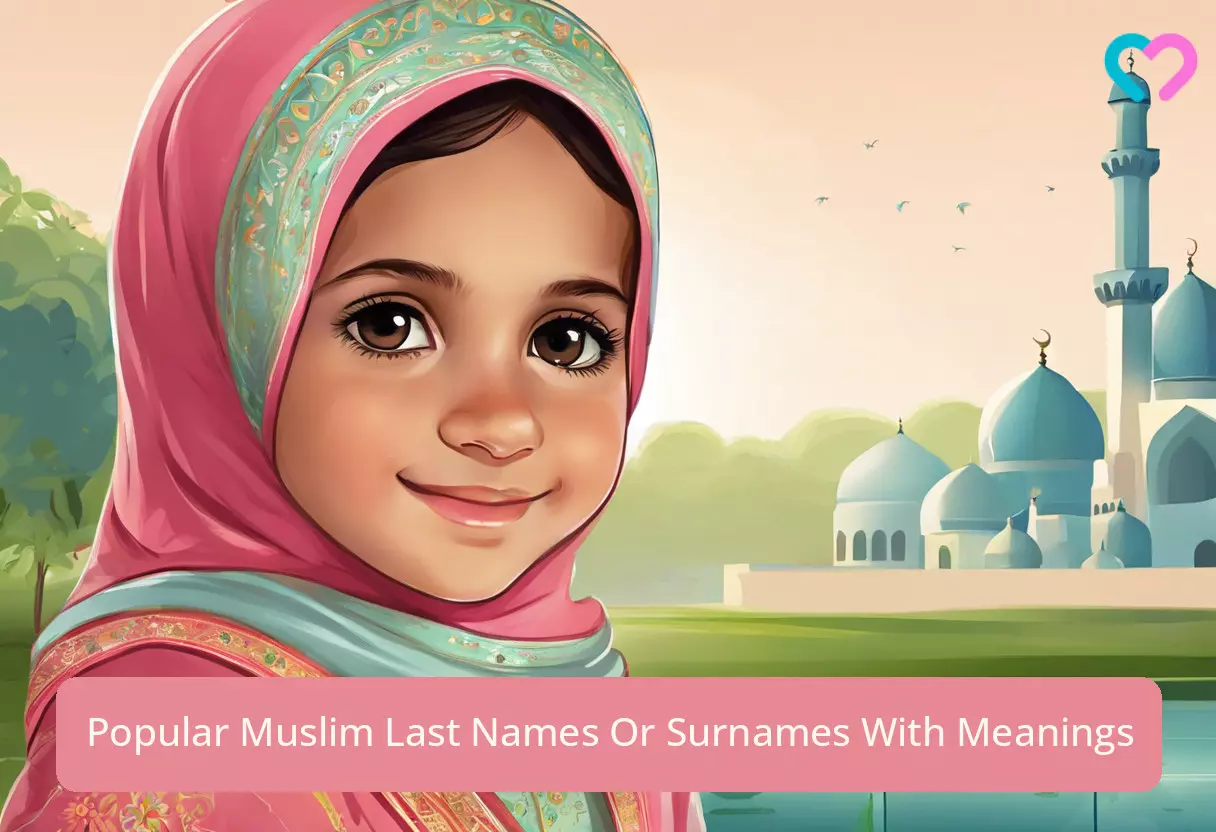
Image: Stable Diffusion/MomJunction Design Team
References:
- A Woman Changing Her Last Name after Marriage
https://www.troid.org/a-woman-changing-her-last-name-after-marriage/ - Cat Stevens
https://www.crb.gov/proceedings/2006-3/riaa-ex-a-103-dp.pdf - Omar Sharif
https://www.themoviedb.org/person/5004-omar-sharif - Mohammed bin Rashid Al Maktoum
https://projects.icij.org/investigations/pandora-papers/power-players/en/player/mohammed-bin-rashid-al-maktoum - Malala Yousafzai
https://www.nobelprize.org/prizes/peace/2014/yousafzai/lecture/ - A guide to names and naming practices
https://www.fbiic.gov/public/2008/nov/Naming_practice_guide_UK_2006.pdf
Community Experiences
Join the conversation and become a part of our nurturing community! Share your stories, experiences, and insights to connect with fellow parents.
Read full bio of Arshi Ahmed
Read full bio of Shikha Thakur
Read full bio of Nida Shaikh









